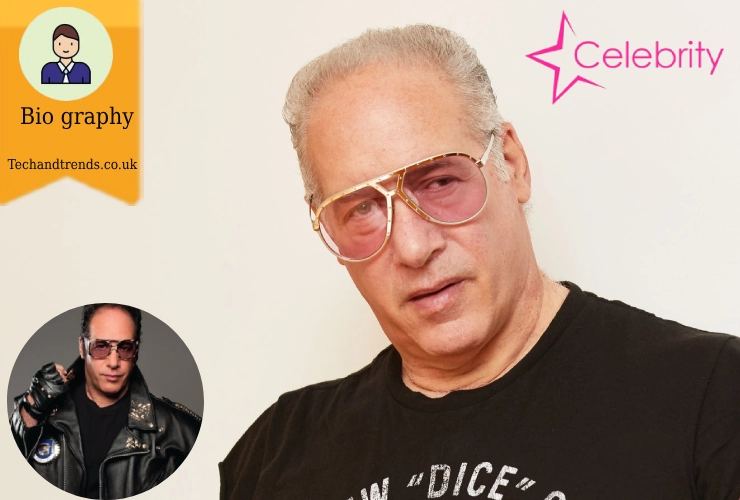Andrew Dice Clay: Biography
Andrew Dice Clay is a legendary American stand-up comedian and actor, known for his brash, controversial stage persona, “The Diceman.” Rising to fame in the late 1980s, Clay became a household name for his boundary-pushing comedy and memorable performances in film and television. Over the decades, he has remained a significant figure in the entertainment industry, both for his comedic talent and his resilience in the face of controversy.
Summary Table: Key Facts about Andrew Dice Clay
| Attribute | Details |
|---|---|
| Real Name | Andrew Clay Silverstein |
| Stage Name | Andrew Dice Clay |
| Nickname | The Diceman |
| Birth Date | September 29, 1957 |
| Age (2025) | 67 years old |
| Birthplace | Brooklyn, New York, USA |
| Parents | Jacqueline and Fred Silverstein |
| Siblings | One sister |
| Height | 5’11” (180 cm) |
| Weight | 172 lbs (78 kg) |
| Marital Status | Divorced (three marriages) |
| Children | Max and Dylan Silverstein |
| Net Worth | $10 million (2025) |
| Notable Roles | The Adventures of Ford Fairlane, Blue Jasmine, A Star Is Born |
| @andrewdiceclay |
Andrew Dice Clay’s story is one of resilience, reinvention, and relentless pursuit of comedic greatness. Whether on stage, on screen, or online, he continues to captivate audiences and shape the world of comedy for generations to come.
Andrew Dice Clay: Parents
Andrew Dice Clay was born Andrew Clay Silverstein on September 29, 1957, in Brooklyn, New York. His parents are Jacqueline and Fred Silverstein. Clay’s father, Fred, was a real estate agent and also a boxer, while his mother, Jacqueline, was a homemaker.
He grew up in the Sheepshead Bay neighborhood of Brooklyn, and his family played a supportive role in his early interest in performing. Clay often credits his father for encouraging his unique comedic style, even attending his shows and appreciating the originality of his act.
Andrew Dice Clay is active on Instagram under the handle @andrewdiceclay. On his Instagram, he shares updates about his comedy tours, throwback photos, behind-the-scenes glimpses from his career, and personal moments.
His account is a mix of promotional material for his shows and merchandise, as well as candid insights into his daily life. Fans can find photos, videos, and stories that capture his larger-than-life personality and ongoing engagement with his audience.
Age
Andrew Dice Clay was born on September 29, 1957. As of May 2025, he is 67 years old. Despite being in his late sixties, Clay continues to perform stand-up comedy, act in films and television, and remain active on social media, demonstrating his enduring appeal and energy.
Andrew Dice Clay: Net Worth
Andrew Dice Clay’s net worth is estimated to be around $10 million as of 2025. His wealth comes primarily from his successful career as a stand-up comedian, actor, producer, and writer. Clay made history in 1990 as the first stand-up comedian to sell out Madison Square Garden for two consecutive nights, a testament to his popularity at the height of his career.
In addition to his comedy and acting earnings, Clay has invested in real estate, owning homes in Hollywood and Las Vegas, and has a notable car collection.
Wikipedia
Andrew Dice Clay’s Wikipedia page provides a comprehensive overview of his life and career. Born Andrew Clay Silverstein, he began performing impressions for his family at the age of five and later became a drummer, performing at parties and events under the name Clay Silvers. He transitioned to stand-up comedy in the late 1970s, developing his iconic “Diceman” persona that would make him famous.
Clay’s career highlights include starring in the 1990 film The Adventures of Ford Fairlane, releasing several successful comedy albums, and appearing in acclaimed films such as Woody Allen’s Blue Jasmine (2013) and the 2018 remake of A Star Is Born, for which he received a Screen Actors Guild Award nomination.
He also starred in the Showtime series Dice, which ran for two seasons, and launched his podcast, I’m Ova Hea’ Now, in 2018.
Photos
You can find photos of Andrew Dice Clay on his official Instagram account and on entertainment databases like IMDb.. These photos showcase his signature style-often featuring leather jackets, sunglasses, and a confident stance that reflects his “Diceman” persona.
Fans can find images from his early stand-up days, film and television roles, and recent appearances at comedy clubs and events. His visual presence remains iconic, instantly recognizable to fans of comedy and pop culture.
Height
Andrew Dice Clay stands at 5 feet 11 inches (180 cm) tall and weighs approximately 172 pounds (78 kg)[8]. His imposing stature, combined with his bold stage presence and distinctive voice, has contributed to his memorable performances both on stage and screen.
Siblings
Andrew Dice Clay has one sibling-a sister. He grew up in a close-knit Jewish family in Brooklyn. While his sister has largely stayed out of the public eye, Clay has occasionally mentioned his family background in interviews and performances, highlighting the influence of his upbringing on his comedic style.
Girlfriend
Andrew Dice Clay has been married three times but is not publicly known to be in a current relationship as of 2025. His marriages were to Kathleen Swanson (1984–1986), Kathleen Monica (1992–2002), and Valerie Vasquez (2010–2014). He has two sons, Max and Dylan, with his second wife, Kathleen Monica.
Max Silverstein has followed in his father’s footsteps, pursuing a career in stand-up comedy. Clay’s romantic life has often been part of his public persona, but he tends to keep current relationships private.
Early Life and Career
Andrew Dice Clay was born and raised in Brooklyn, New York, to a Jewish family. From a young age, he was drawn to performing, entertaining his family with impressions at just five years old. By seven, he was already playing drums, inspired by big band music.
Clay attended James Madison High School in Brooklyn and later worked as a drummer in the Catskills, performing at weddings and bar mitzvahs under the name Clay Silvers.
After briefly attending Kingsborough Community College, Clay decided to pursue comedy full-time. He began performing at local comedy clubs, developing his act and eventually creating the “Diceman” persona-a character known for his tough, unapologetic attitude and risqué humor. This persona, inspired by pop culture icons like Elvis Presley and John Travolta, became his signature and propelled him to national fame.
Rise to Fame
Clay’s big break came in the late 1980s when his “Diceman” character resonated with audiences seeking edgy, boundary-pushing comedy. His performances were marked by a brash Brooklyn accent, leather jackets, and a swaggering stage presence. Clay’s material often courted controversy, but it also attracted a massive following, especially among young adults.
In 1990, Clay made history by becoming the first stand-up comedian to sell out Madison Square Garden for two consecutive nights-a milestone that cemented his status as a comedy superstar. That same year, he starred in the film The Adventures of Ford Fairlane, further boosting his profile.
Acting Career
Beyond stand-up, Andrew Dice Clay has enjoyed a successful acting career. He has appeared in numerous films and television shows, often playing characters that reflect his tough-guy persona. Some of his most notable roles include:
- The Adventures of Ford Fairlane (1990) – Lead role as Ford Fairlane
- Blue Jasmine (2013) – Supporting role in Woody Allen’s critically acclaimed film
- A Star Is Born (2018) – Played Lorenzo, the father of Lady Gaga’s character, earning a Screen Actors Guild Award nomination
- Dice (2016–2017) – Starred in his own semi-autobiographical Showtime series
- Appearances in Entourage, Vinyl, Pam & Tommy, and other TV series.
Clay has continued to act in both comedic and dramatic roles, showcasing his versatility as a performer.
Personal Life
Clay’s personal life has often been in the spotlight. He has been married three times and has two sons, Max and Dylan. Max Silverstein, known professionally as Max Silver, has pursued a career in stand-up comedy, following in his father’s footsteps[4].
Clay has spoken openly about the challenges and controversies he has faced, both professionally and personally. Despite facing criticism for his provocative material, he has remained unapologetic, emphasizing the importance of artistic freedom and self-expression in comedy.
Legacy and Influence
Andrew Dice Clay’s impact on comedy is undeniable. He broke new ground with his raw, unfiltered style, paving the way for future generations of comedians willing to tackle taboo subjects. While his material has sometimes sparked backlash, Clay has always maintained that his act is just that-an act, designed to provoke thought and laughter.
His influence can be seen in the work of many contemporary comedians who cite him as an inspiration for pushing boundaries and challenging societal norms. Clay’s legacy is also evident in his continued popularity, with fans old and new attending his shows and engaging with him online.
Real Estate and Lifestyle
Clay has invested in real estate over the years, purchasing homes in Hollywood and Las Vegas. In 2003, he bought a house in Hollywood for $1.179 million and later acquired a property in Las Vegas for $450,000. He sold one of his Hollywood homes in 2010 for $1.399 million. Clay is also known for his impressive car collection, reflecting his love of classic and luxury vehicles.
Social Media Presence
In addition to Instagram, Clay is active on other social media platforms, where he interacts with fans, promotes his shows, and shares his views on various topics. His online presence helps him stay connected with audiences around the world, ensuring his relevance in an ever-changing entertainment landscape.
Awards and Recognition
Throughout his career, Clay has received several awards and nominations, including a Screen Actors Guild Award nomination for his role in A Star Is Born. Although his work often polarizes audiences, the comedy community respects him for his originality and fearlessness.
Fun Facts
- Clay was the first comedian to sell out Madison Square Garden for two consecutive nights.
- He began performing impressions at age five and played drums at parties as a teenager.
- His stage persona, “The Diceman,” was inspired by characters like Elvis Presley and John Travolta.
- He has two sons, Max and Dylan, with his second wife, Kathleen Monica.
- Clay is of Jewish descent and often references his heritage in his comedy.
Recent Projects
Clay continues to tour as a stand-up comedian, performing at venues across the United States. He also appears in films and television series, demonstrating his enduring appeal and adaptability as an entertainer. His recent credits include roles in Warrior Strong (2023), Pam & Tommy (2022), and ongoing podcast and television appearances.
Conclusion
Andrew Dice Clay remains a towering figure in American comedy, known for his bold persona, memorable performances, and unwavering commitment to his craft. From his early days in Brooklyn to his record-breaking shows and acclaimed acting roles, Clay has left an indelible mark on the entertainment industry.
With a net worth of $10 million, a loyal fan base, and a legacy that continues to inspire, Andrew Dice Clay is truly a rock and roll comedy legend.

